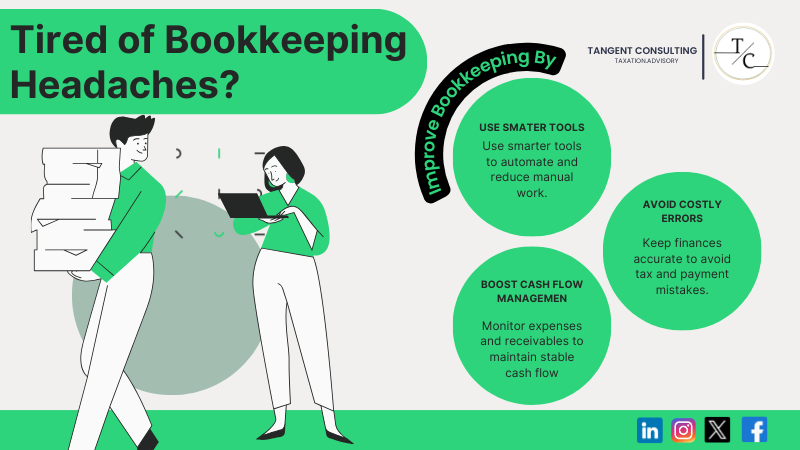Don’t Waste Time! 5 Tips to Improve Bookkeeping for Small Construction Businesses
Don’t Waste Time! 5 Tips to Improve Bookkeeping for Small Construction Businesses

From time to time, Wayne, the CEO of Batcave Construction, looks at his finances. However, every time, his bookkeeping isn’t complete, and the number doesn’t seem to add up.
This is the situation many construction businesses face, and if you can relate to this story, stick with us for the next few minutes. In this guide, we’ll give you 5 practical tips to improve bookkeeping for small construction businesses.
So, grab some coffee, and let’s dive in.

Remember! Construction Bookkeeping is Different
Did you know only 35.9% of construction businesses that started in March 2011 were still operating by March 2022? So, why does it happen?
The reason for this is that in the construction industry, payments often come in chunks, and it can take weeks or even months after project completion to get paid. This creates significant cash flow issues.
Let’s break down what makes bookkeeping for small construction businesses unique and why you should get it right.
1. Handling Several Projects
In most industries, you manage a single revenue stream or maybe a handful of products. But in construction, you need to manage several projects. Each project has its own budget, timelines, labor costs, and material expenses. It can become difficult to keep track of all of these.
For example, imagine you’re working on three projects simultaneously. Project A is nearing completion, Project B is midway, and Project C has just started. You’ve purchased materials for all three, paid subcontractors for two, and invoiced only one.
Without bookkeeping, you might end up mixing costs, double-paying suppliers, or worse—running out of funds for an ongoing project.

2. Overhead Costs
Overhead costs are the expenses that don’t tie directly to a specific project, like office rent, utilities, salaries, etc. While these costs may seem straightforward, if you aren’t going to record them properly, your profits won’t meet your expectations.
For example, let’s say you complete a project with low-profit margins. But when you check the numbers, overhead costs have eaten your profits.
And don’t just take our word for it. According to studies, small construction companies spend an average of 10% of their revenue on overhead costs. This makes it important to track these costs.
3. Long-term Contracts
Long-term contracts are both a blessing and a challenge. While they provide steady work and revenue, they also introduce a layer of complexity to your bookkeeping.
As we mentioned earlier, payments are often spread out over months or even years and tracking income against expenses becomes a game of patience.
For instance, Wayne builds a custom home on a 12-month contract. He receives payments in milestones—10% at the start, 40% halfway through, and the remaining 50% upon completion. Meanwhile, his costs for materials and labor fluctuate throughout the year. Without proper bookkeeping, he wouldn’t be able to track if the project is profitable.

5 Tips to Improve Bookkeeping for Small Construction Business
As Peter Drucker once said, “What gets measured gets managed.” In the construction world, this principle couldn’t be more relevant—especially when it comes to your finances.
With that in mind, let’s dive into five actionable tips that can help master bookkeeping for small construction businesses.
1. Separate Business and Personal Finances
Mixing business and personal finances is a great way to create chaos and confusion in your bookkeeping. You aren’t going to believe us, but it’s a common trap for small construction business owners.
Using the same account for both a trip to the hardware store and a family dinner may seem harmless at first, but it can lead to a disaster during tax season.
If you are asking, “Oh Tangent, why is it important, why can’t I do this”?
Here’s the thing: keeping your business and personal finances separate provides a clear view of your company’s financial health. It also simplifies tracking expenses, filing taxes, and even securing loans or funding for your business.
You need to open a dedicated business bank account and credit card as soon as possible. After that use them exclusively for business-related transactions like buying materials to paying subcontractors.
Speaking of business credit cards, if you haven’t got one, Ramp provides corporate cards, and through it, you can pay bills, manage expenses, send invoices, and so much more. Plus, it gives you a $500 sign-up bonus, thanks to our partnership with them. So, make sure to check out the link here.

2. Use Job Costing
Unlike general accounting, job costing tracks all the direct and indirect costs associated with a specific project, like materials, labor, equipment, subcontractors, and even allocated overhead.
This level of detail allows you to determine not only if a project is profitable but exactly where your money is going.
Let’s say you’ve completed a renovation project that seemed profitable on paper, but when you break down the numbers, you realize the labor costs were significantly higher than estimated, eating into your profits.
Job costing doesn’t just help you identify profit leaks; it also allows you to:
- Use historical data to make more accurate estimates for future projects.
- Monitor actual costs against estimates and adjust spending.
- Identify areas where you’re overspending.
3. Track Your Revenue
Without proper revenue tracking, you risk overestimating your cash flow or underreporting your income, both of which can lead to financial troubles.
To track your revenue, you can
- Always reconcile incoming payments with the appropriate invoice. This ensures you’re not missing out on money owed or misallocating funds.
- For long-term contracts, the accrual accounting method helps you recognize revenue as it’s earned rather than waiting until payment is received.
- You can track by using accounting software (more on that in a short while).
Pro Tip: Create a dedicated section in your bookkeeping system for progress payments. This will help you track which stage of a project you’re getting paid for and how much is still outstanding.

4. Use a Software
Construction bookkeeping is complex, with unique challenges like job costing, progress billing, and managing subcontractor payments. Accounting software automates these processes, thus saving you time and money.
They automatically generate invoices and track payments for each project. Also, you can check your income and expenses to avoid cash flow gaps.
If you are looking for software, you can check some of the best in our detailed guide here.
5. Hire a Bookkeeper
Sometimes, the smartest move you can make is to delegate. Managing construction bookkeeping requires a specific skill set. You need to track project expenses and check tax regulations to ensure compliance with labor laws. All these complexities can be overwhelming.
A skilled bookkeeper brings expertise, organization, and a fresh perspective. Here’s how they can help you:
- Free up hours spent on tedious bookkeeping tasks.
- Many bookkeepers specialize in industries like construction, so they understand job costing, progress billing, and other unique challenges.
- Reduce the risk of costly errors in your records, tax filings, and payroll.
- Bookkeepers can provide valuable insights into your cash flow, expenses, and profitability.
Pro Tip: If hiring a full-time bookkeeper isn’t feasible, consider outsourcing to a professional bookkeeping service like Tangent Consulting. It’s a cost-effective way to get expert help without adding a permanent employee to your payroll.

Final Thoughts
So, there you go! These are some of the steps to improve bookkeeping for small construction businesses. You need to remember that construction bookkeeping is different, and it requires a different strategy to manage the unique challenges of the industry.
So, invest in learning these practices, applying the right tools, and seeking professional help when needed.
Speaking of professional help, Tangent Consulting has years of experience as a business coach and CFO for construction businesses. With us, you don’t need to hire an accountant or business coach separately; you can get both in one place.
PS If you are reading this, it means you can have access to our free consultation for your construction business. Avail this for free today before we change our mind 😉
FAQs
Which method of accounting is best for construction companies?
The percentage-of-completion method is often the best for construction companies. It allows you to recognize revenue and expenses as the project progresses.
How do you record construction accounting?
Construction accounting involves recording revenue, expenses and costs specific to each project using job costing.
What is accrual in construction?
Accrual in construction refers to recognizing revenue and expenses when they are earned or incurred rather than when cash is received or paid.
